Beware of booze
Many people associate stomach bloating with beer (hence the term “beer belly”), but any alcoholic beverage can actually make your stomach puff up, says gastroenterologist Robynne Chutkan, MD, the founder of the Digestive Center for Women in Chevy Chase, MD and the author of The Bloat Cure: 101 Natural Solutions for Real and Lasting Relief. Alcohol wipes out the beneficial bacteria in your digestive system that normally keep bloat in check. It can also lead to gastritis and liver damage, both of which cause bloat, and it’s high in calories. You don’t need to abstain completely, though; just try to consume no more than a drink a day. Read on for more of Dr. Chutkan’s natural solutions to reduce stomach bloating.
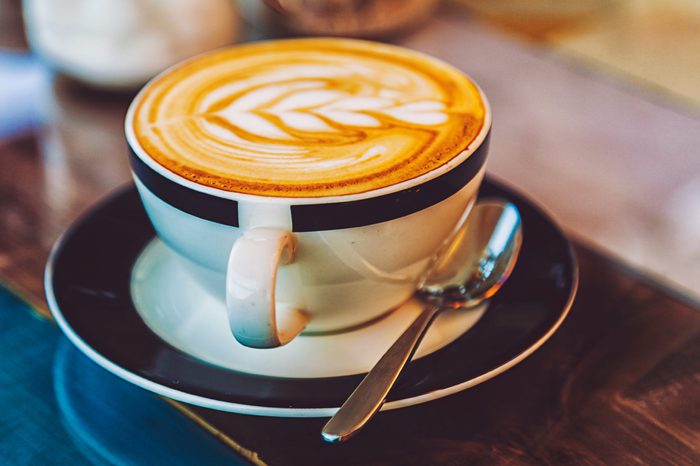
Cut down on caffeine
Since caffeine is a well-known diuretic, it makes sense that some people might expect it to move water and salt out of your body, and thus reduce bloating. But caffeine can cause dehydration, which makes your digestive system sluggish and can lead to blockages. So sorry, coffee fans, but when it comes to reducing bloating, the less caffeine the better.
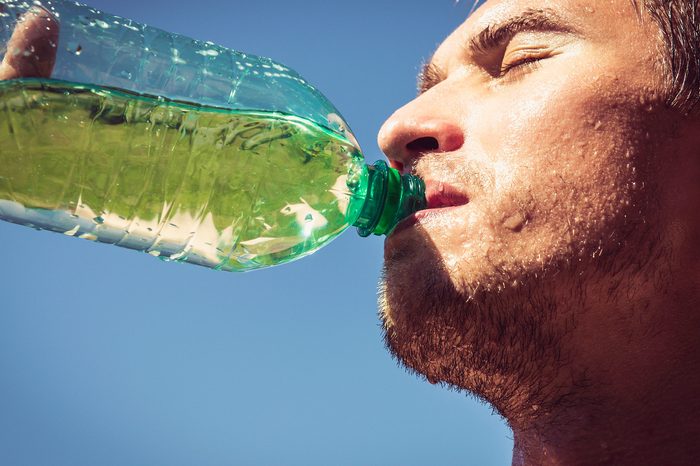
Skip the sports drinks
Sports drinks are marketed as an alternative to soda, but unless you’re a pro athlete or exercising like one, give them a pass. These beverages are full of artificial sweeteners, extra sodium and other salts, all of which can cause bloating. Some of them also have a surprising amount of calories. After you work out, replenish your fluids with plain old water or unsweetened, unflavored coconut water.
The 3 Best Hydrating Beverages That Aren’t Water, from a Certified Sports Dietitian
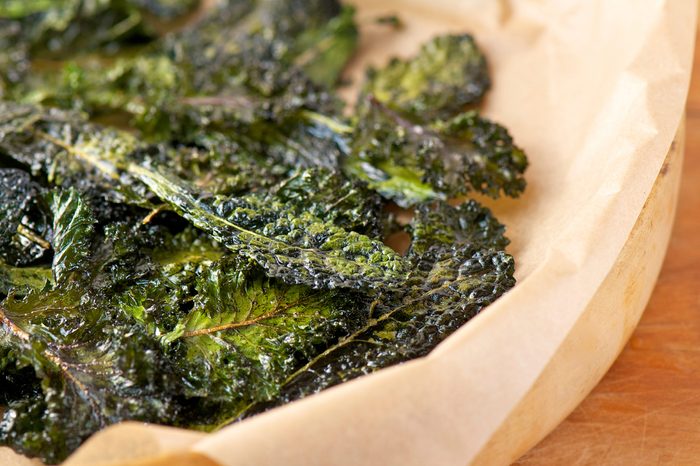
Look beyond the beans
We all know that beans cause gas, but did you know that kale, cauliflower and broccoli contain the same gas-inducing compound, called raffinose? Because our bodies are unable to completely digest naturally occurring raffinose, the bacteria in the colon ferment it, creating stinky methane and causing bloating, according to the International Foundation of Gastrointestinal Disorders. You shouldn’t cut these veggies out of your diet since their nutritional benefits far outweigh the bloating drawbacks, but you can take Beano or Bean-zyme (they contain an enzyme that helps break down raffinose) before you’re about to consume any of them.
3 Worst Foods That Cause an Unhealthy Gut, from a Seattle Gastroenterologist
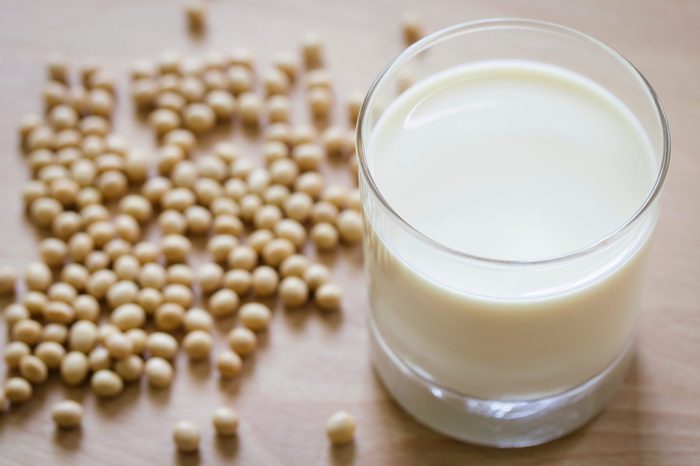
Switch out processed soy
Soy contains compounds that are chemically similar to estrogens and have estrogen-like effects, including bloating and weight gain. You should reduce the amount of processed, unfermented soy (the kind found in soy milk and soy cheese) that you consume. However, eating small amounts of unprocessed fermented soy such as miso, natto and tempeh is okay, says Dr. Chutkan. If you’re lactose intolerant and rely on soy milk as your dairy substitute, substitute almond milk, coconut milk or rice milk instead.
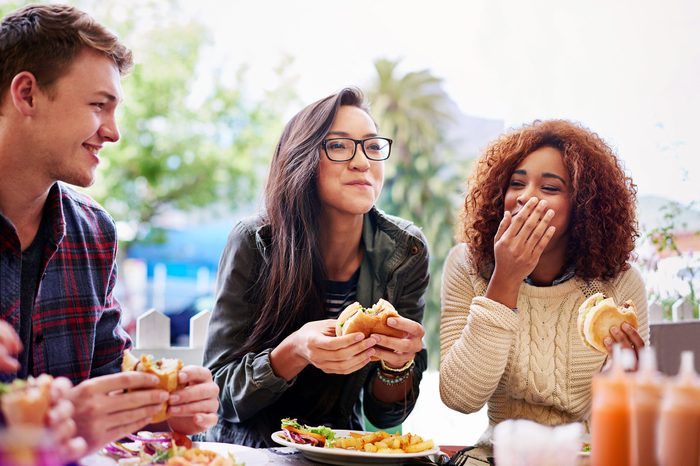
Respect your body’s rhythms
Your body follows its own cycle, and that goes for your digestive system, too. Like your brain, your stomach is more active during the day, and quieter at night. This means that the later you consume a big meal, the slower your GI tract digests it. Also, the later in the day it is, the less likely you are to be up and on your feet, allowing gravity to assist in moving your system. So shrink your meal sizes as the day goes on. If you want to go out to eat, go for lunch or brunch.
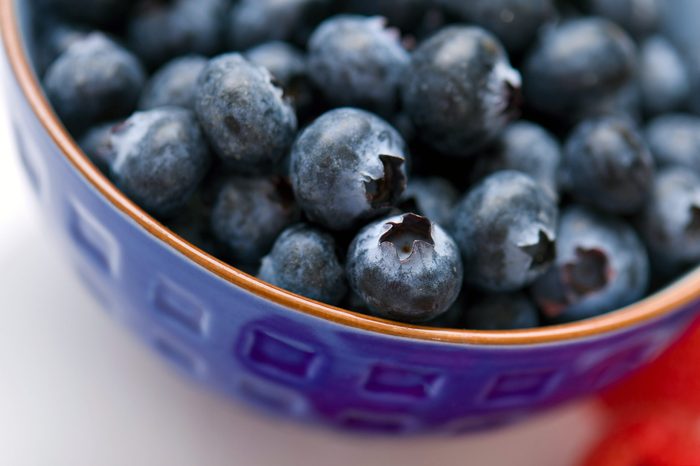
Fill up on fiber (the right way)
You probably don’t need to be told that a high-fiber diet is good for you—but you should know that supersize servings of fiber can sometimes block your digestive system. This is more likely if your stomach and intestines aren’t typically used to so much fiber, or if you’re not consuming enough water to flush out your GI tract. To avoid those effects, always drink plenty of water with your meals; try to ingest your fiber earlier in the day, when your stomach is most active; space it out so you don’t eat all your fiber in one meal; and take a vigorous walk after you finish eating to trigger peristalsis, the natural movement of your gut muscles.
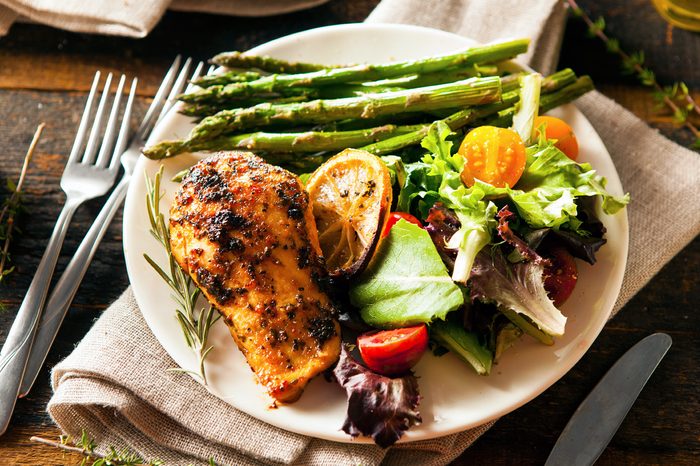
Eat measured amounts of meat
Meat takes more time for your digestive system to break down and pass through, leading to bloat. “Eating a lot of meat can expose you to unhealthy amounts of antibiotics that throw your gut bacteria out of whack and fill you with gas,” says Dr. Chutkan. To reduce bloating, he suggests adjusting your diet so that you consume no more than four ounces of animal protein a day.
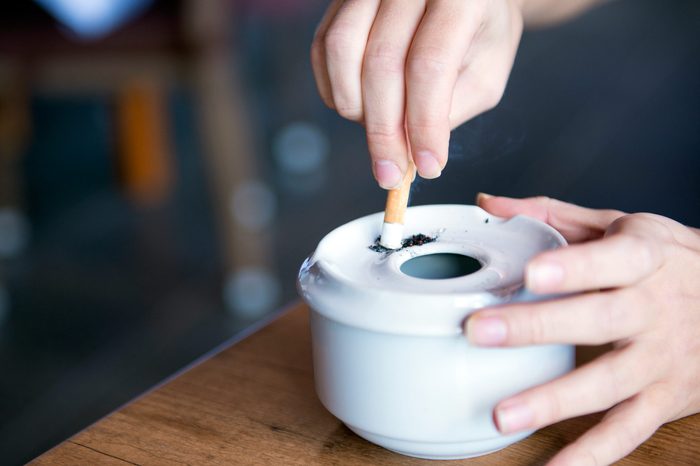
Quit smoking
We’ll let Dr. Chutkan give it to you straight. “Smoking is guaranteed to add to your bloat in three important ways,” she explains. “You end up inhaling and swallowing a lot of air when you smoke; the toxins in cigarette smoke cause inflammation in the lining of your stomach and intestines, which makes you bloated and uncomfortable; and smoking kills beneficial bacteria in your digestive tract, leading to overgrowth of bloat-causing bad bacteria.”
Ex-Smokers Reveal What Helped Them Actually Quit Smoking For Good
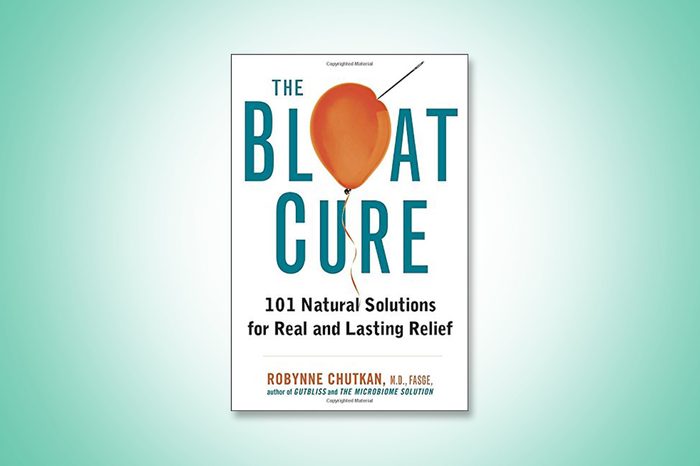
Ready to beat bloat?
Robynne Chutkan, MD, is the founder of the Digestive Center for Women in Chevy Chase, Maryland, as well as a faculty member at Georgetown University Medical Center in Washington, D.C. During the course of her practice, she has treated thousands of patients who’ve been troubled by bloating and gas. If you’re interested in learning more about the different causes of bloat and how to combat them, take a look at her book The Bloat Cure: 101 Natural Solutions for Real and Lasting Relief.
For more wellness updates, follow The Healthy on Facebook, Instagram, and Twitter. Keep reading:
